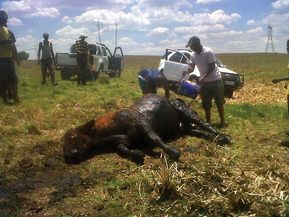
Cows, goats and chickens could be seen milling about outside several homes as Nestor pulled his Fortuner SUV onto the road. He knew that these animals represented the livelihood of their owners. People in Swartdam rely on their livestock to provide milk, eggs, meat — and, most importantly, income.
Such income is vital to many families. The homes Nestor drove past were little more than shacks. Built of corrugated iron on bare ground, strong winds and rain would be enough to knock them down. Swartdam is a poor community made up primarily of black Africans, who are still a marginalized group in South Africa. Many in Swartdam are uneducated and unskilled, and 43 percent of the population is unemployed. Crime is a major problem, as well as HIV/AIDS.
These social factors are further aggravated by the negative portrayal of Christians in the media. Unfortunately, when many in Swartdam think of Christianity, they think only of the prosperity gospel. Preachers on the TV and the radio never urge their followers to help and serve the community; they only ask for people’s money. This impression creates a wall of mistrust between our workers and the families they strive to reach. Trust must be earned before the true Gospel can be shared.
A figure rushed onto the road ahead, jarring Nestor from his thoughts. The man was waving his arms and signaling for Nestor to stop his SUV. Wondering what this man could need, Nestor pulled over and leapt from his vehicle. The man was a farm manager, and he led Nestor away from the road and into a nearby field. The scene that Nestor found there told him everything in an instant.
Surrounding an enormous mud puddle next to a drying creek were several men and a pickup truck — and in the middle of the mud was a scared, exhausted cow. The animal had sunk more than halfway into the wet, sticky mess so that only its head and back could still be seen. The men had tied one end of a rope around the cow’s middle and the other end to the truck, but they clearly hadn’t made any progress in their efforts to pull it free. The pitiful creature mooed weakly.
An observer who didn’t know better might have found the scenario funny, but there were no smiling faces in the group that met Nestor. He could guess what they were all thinking. The farm manager was likely wondering what he would tell the farm owner if they were unable to free his cow. If the cow was not rescued from the mud, it would die there — and that would be a tremendous loss for the farm. The other workers were likely wondering how this problem would affect their families. If the cow was lost, the farmer might not be able to pay them. Had they worked hard that day in the African heat only to return home empty-handed? The situation was bleak.
Nestor quickly returned to his SUV and drove it into the field next to the farm manager’s truck. The men helped Nestor tie his vehicle to the cow, and then both drivers got behind their wheels. Saying a short prayer, Nestor gently gave the vehicle some gas and looked in his rearview mirror.
To everyone’s delight, the cow began to rise out of the mud. The combined power of the truck and the SUV was enough to make the difference. The farm workers cheered as the vehicles pulled the cow free and dragged it away from the mud. The fatigued animal lay helplessly on its side, too weak to move, but finally free.
The farm manager and workers gathered around Nestor to thank him for his help, but Nestor knew he could still help them in a more important way. He took the opportunity to share the Gospel and told the farm workers how much Jesus loves them.
To Nestor’s joy, the farm manager and four of the other workers gave their lives to Jesus.
The farm manager said he had never believed in the Jesus he heard about from the prosperity preachers in the media — but he does believe in the Jesus Nestor follows. Nestor didn’t just speak about Jesus; he showed Jesus through his actions. His willingness to serve strangers in need was a testimony of God’s love for them.
The farm manager offered to lend his pickup truck to the families of the four other new believers so they could go to church. Now, they all ride together to worship with the nearby Rock of Ages congregation each week.
Antonie Boshoff, the National Director of Every Home for Christ South Africa, often reminds his teams that, as they preach the Gospel, they should also live it out each day.
“Actions speak louder than words,” he says. “People in the world do not read their Bibles, but they read you as a child of God.”
This blog post is from Every Home for Christ. To find the original post, go to: www.ehc.org/blog/stuck-in-the-mud
 RSS Feed
RSS Feed